Japan-Italy Relations
Japan-Italy Foreign Ministers’ Meeting

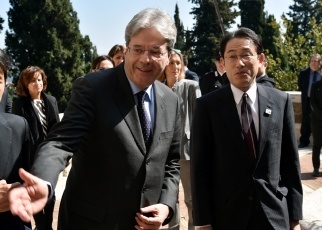
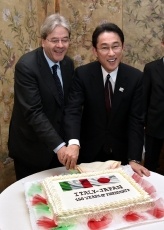
On March 19, commencing at noon for approximately two hours and 10 minutes, Mr. Fumio Kishida, Minister for Foreign Affairs of Japan, during his visit to Rome in Italy, held a meeting over lunch with H.E. Mr. Paolo Gentiloni, Minister of Foreign Affairs and International Cooperation of Italy. The overview of the meeting is as follows.
Following the meeting, the two foreign ministers signed the Agreement on the Security of Information between Japan and Italy (PDF) .
.
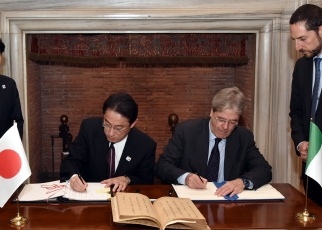
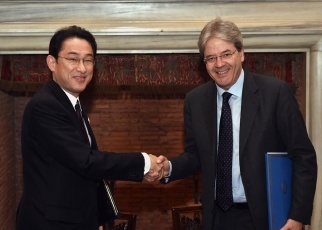
1. Beginning
(1) Minister Kishida explained that he visited Italy to exchange views with Minister Gentiloni ahead of the G7 Hiroshima Foreign Ministers’ Meeting in April, and expressed his pleasure that various events were being held in both Japan and Italy this year which marks the 150th anniversary of the establishment of diplomatic relations between the two countries.
(2) Minister Gentiloni expressed his happiness to welcome Minister Kishida in Rome, and stated that he hoped to thoroughly exchange views on the cooperation toward the G7 Hiroshima Foreign Ministers’ Meeting.
2. Japan-Italy relations and Japan-European Union (EU) relations
(1) The two foreign ministers appreciated the current excellent bilateral relationship between their two countries, and shared the view that they would expand the Japan-Italy relations in a broad range of fields in this milestone year of the 150th anniversary of the establishment of diplomatic relations between Japan and Italy.
(2) With regard to the economic relations, Minister Gentiloni stated that, given the economic scale of both countries, there was the potential to further advance the bilateral economic relations. Touching upon the Japanese investment in Italy, Minister Kishida expressed his expectation that advancement into the global markets would be made as a result of cooperation between companies of both countries.
(3) The two foreign ministers affirmed the further strengthening of cooperation in the security field and shared the view that, from that perspective, the Agreement on the Security of Information scheduled to be signed following the meeting was significant for contributing to advancing security and defense cooperation between the two governments.
(4) Both foreign ministers agreed that, from the standpoint of boosting exchanges between the two countries’ citizens, they would accelerate discussions on introducing a working holiday scheme, and that in order to vitalize economic relations, the two countries would move ahead with the domestic procedures necessary to promptly bring the Agreement between Japan and Italy on Social Security into force.
(5) The two foreign ministers also shared the view that they would continue to cooperate on promptly reaching an agreement in principle on the Japan-EU Economic Partnership Agreement (EPA), as well as on the early conclusion of the Japan-EU Strategic Partnership Agreement (SPA), and would pursue cooperation relating to the Passenger Name Record (PNR) from the perspective of international counterterrorism. In addition, Minister Kishida mentioned the restrictions on the import of food and other products from Fukushima Prefecture in relation to the Great East Japan Earthquake, and stated that he hoped to see further easing in the restrictions on a scientific basis, to which Minister Gentiloni responded that he would cooperate to that end.
3. Cooperation toward the G7
(1) Global issues
(i) Minister Kishida explained that, at the G7 Ise-Shima Summit, Japan intended to present the optimum route toward the peace and prosperity of the world as a presidency holder of G7 countries sharing fundamental values such as freedom, democracy and the rule of law. Minister Kishida also stated that at the G7 Foreign Ministers’ Meeting he hoped to express a strong message by discussing countermeasures against terrorism and violent extremism, the refugee issue, the Middle East, Ukraine and Russia, maritime security, challenges in Asia and non-proliferation and disarmament. The two foreign ministers noted that Japan and Italy would serve as the G7 presidency holders this year and next year respectively, and confirmed cooperation in the context of the G7, including for a successful G7 Hiroshima Foreign Ministers’ Meeting.
(ii) The two foreign ministers confirmed their cooperation in the field of non-proliferation and disarmament. They also shared the view that it is meaningful to express a message from Hiroshima on realizing a world without nuclear weapons on the occasion of the G7 Foreign Ministers’ Meeting.
(iii) Both foreign ministers confirmed the importance of cooperating closely to prevent terrorism, utilizing each country’s respective strengths to provide mutually complementary support.
(2) Regional situations
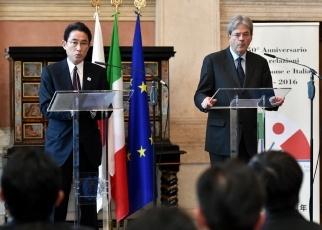
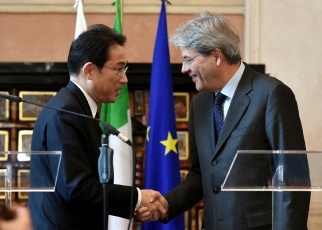
(i) The two foreign ministers also exchanged views on the Middle East (Iran, Iraq, Libya and Syria), the Ukraine-Russia situation, and Asia (the East China Sea and the South China Sea, and North Korea).
(ii) With regard to the Ukraine-Russia situation, the two foreign ministers shared the view that it was important to continue coordination by the G7, and to maintain dialogue to obtain constructive engagement by Russia for resolving various problems, such as the issues in the Middle East.
(iii) With regard to the East China Sea and the South China Sea, the two foreign ministers confirmed that the attempts to unilaterally change the status quo were unacceptable, and that the rule of law at sea, including the freedom of navigation, is important.
(iv) With regard to North Korea, Minister Kishida stated that the nuclear test in January and the ballistic missile launches in February and March were unacceptable and that the international community should make a firm response, and asked for Italy’s cooperation in comprehensively resolving matters of concerns such as the abduction issue, the nuclear issue and the missile issue. The two foreign ministers shared the view that it was important to utilize opportunities such as G7 Foreign Ministers’ Meeting to send clear messages to North Korea.

